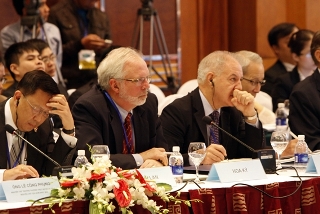 The Asia-Pacific Economic Cooperation (APEC) said it plans to review the course the regional bloc will take to foster cooperation as free trade agreement proposals increase and global economic developments come at an increasingly rapid pace.
The Asia-Pacific Economic Cooperation (APEC) said it plans to review the course the regional bloc will take to foster cooperation as free trade agreement proposals increase and global economic developments come at an increasingly rapid pace.
“As APEC works towards greater free trade and market integration, game-changing issues in the regional and global economic environment are prompting member economies to rethink how best to achieve these goals to better support cross-border business and long-term growth,” said an official statement released by the APEC Secretariat following the recent gathering of regional officials and private sector representatives in Ha Noi, Vietnam, for the 15th anniversary of Vietnam’s ascension to APEC.
“The weak global economic recovery, rise in protectionism, uncertainty in the international trading system and shifts in the regional architecture are cause for introspection among us,” said Pham Binh Minh, Vietnam’s Foreign Affairs Minister and newly designated Deputy Prime Minister.
“It is time to rethink and act together to retain APEC’s relevance,” he further said.
Ambassador Tan Jian, China’s senior APEC official, added, “The direction APEC should take in the 21st century Asia-Pacific is a question on the minds of many, not to mention China as next year’s chair. Member economies have expressed high expectations and a desire to pursue an agenda that is result-oriented, strategic and future-focused.”
Tan noted that as free trade agreements proliferate, people are asking how it will affect APEC’s vision for a region-wide free trade area.
“Will it lead to regional integration or fragmentation? We hope to send a message to the world that measures such as TPP and RCEP are not competing with each other but can be complementary.”
The Trans-Pacific Partnership (TPP) is a proposed trade agreement under negotiation by Australia, Brunei, Chile, Canada, Japan, Malaysia, Mexico, New Zealand, Peru, Singapore, the United States, and Vietnam, while the Regional Comprehensive Economic Partnership (RCEP) is a proposed FTA between the 10 ASEAN member-economies and Australia, China, India, Japan, Korea, and New Zealand.
In Vietnam’s case, the APEC region now accounts for 65 percent of its total foreign direct investment, 60 percent of exports, and 80 percent of imports. And 12 out of 14 free trade agreements it has signed or is currently working on are with APEC economies.
APEC economies’ priority areas of collaboration during China’s chairmanship will be set at a curtain-raising meeting in Beijing on December 10, 2013, the Secretariat said.
“Feeling out APEC’s role as an integrator could become an issue meriting greater focus as we learn more about where global and regional trade talks stand in the coming weeks,” said Alan Bollard, executive director of the Secretariat.




